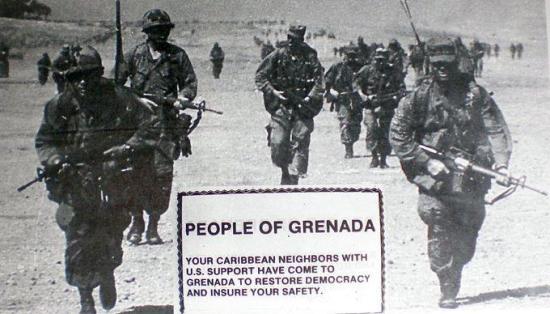
Less than two weeks after the Venezuelan Constituent Assembly election on 30 July, US President Trump threatened the country with direct military action. This was the latest example of US imperialism’s history of intervention in Latin America and the Caribbean since the end of the Second World War. Such intervention has consisted mostly of undermining any government that threatens its interests through the use of economic warfare, and by funnelling money, arms and intelligence into right-wing opposition groups. However, in a few instances, it has involved direct military intervention (Dominican Republic, Grenada and Panama).
The list includes:
- Guatemala, 1954, to overthrow the progressive Arbenz government which was threatening to take over land belonging to the giant United Fruit Company.
- Cuba, 1961 – supporting the Bay of Pigs invasion and orchestrating numerous acts of terrorism as well as hundreds of attempts to assassinate Fidel Castro. The illegal blockade has continued to this day.
- Brazil, 1964 – to install a military dictatorship which lasted 20 years.
- Guatemala 1964-84 – providing military intelligence and logistical support in a war against the poor and indigenous people which in the early 1980s amounted to near-genocide of the Maya people. Over 200,000 people were either murdered or disappeared.
- Dominican Republic, 1965 – an invasion by US marines following a military coup against the reformist Bosch government.
- Chile, 1973 – to promote economic sabotage of the Allende government and then to help prepare a military coup which led to more than 4,000 deaths and the torture of tens of thousands more.
- Argentina, 1976 – to bankroll Operation Condor which involved the assassination of more than 20,000 socialists and democrats. This extended to Chile and Uruguay.
- EL Salvador 1979-1991 – to ensure that the popular revolution against the handful of families who ran the country was defeated. 40,000 people were murdered between 1981-84.
- Nicaragua, 1981-90 – to provide military aid and support for Contra fascist guerrillas in an attempt to destroy the progressive Sandinista government. The campaign included mining the principal harbours of the country.
- Grenada, 1983 – following the assassination of Maurice Bishop, US troops invaded the country to destroy the New Jewel Movement and evict Cuban civilians.
- Panama, 1989 – to remove President Norriega, a one-time US puppet and CIA informant who became a liability because of his involvement in massive drug smuggling.
- Venezuela, 2002 – the Bush government backed a coup attempt against President Chavez which subsequently failed.
- Haiti, 2004 – the US backed brutal paramilitaries to depose President Aristide. It had occupied the island in 1915
- Honduras, 2009 – US Secretary of State Hillary Clinton back a coup to depose President Zelaya who was moving in a progressive direction. She then orchestrated steps to prevent his return as the democratically-elected leader of the country.
- Paraguay, 2012 – The US Embassy in 2009 was already plotting with the opposition to depose mildly-progressive President Lugo, elected in 2008. It achieved its aim through a constitutional coup in 2012.
As economic warfare against the Bolivarian government in Venezuela intensifies, the example of Chile shows where it can lead. Allende’s left-wing government had nationalised Chile’s copper mining companies, many of which were US-owned, as well as 90% of the banking system. Ruling class opposition took the form of lorry blockades and the promotion of artificial food shortages to undermine middle class support for the Allende government. The CIA fed millions of dollars into anti-Allende parties, candidates and media channels. US agencies were also responsible for training armed forces in psychological warfare, interrogation and torture methods, which were later used by General Pinochet’s brutal regime that saw 40,000 people tortured between 1973-1977. Pinochet was clear, during the 1973 coup that he was ‘fighting for the liberation of the Fatherland from the Marxists’. Although the 1974-79 Labour government admitted thousands of Chilean refugees, it broke its promise to sever relations with the Pinochet dictatorship. In 1998, Pinochet was arrested in London to face extradition to Spain on charges of torture and murder. Labour Foreign Secretary Jack Straw freed him on spurious health grounds in March 2000.
Ria O’Grady




